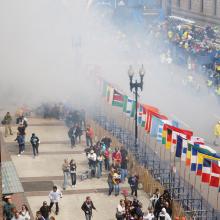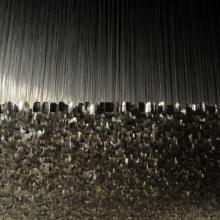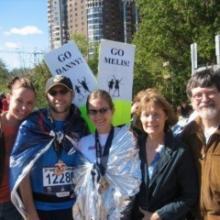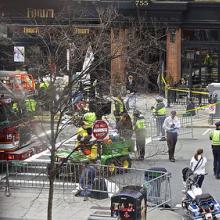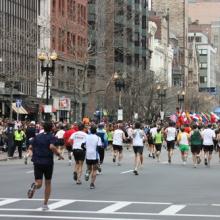Boston Marathon
I hear it over and over again both during my conversations on the road, and as I skim the headlines each day, that we are in a battle for the common good.
I learned about the Boston bombings as my plane landed in Portland, Ore., traveling for an 18-city book tour to spark a conversation on “the common good.” As I read and watched more about the tragedy, there unfolded such a stark and brutal contrast between the explicit intent to kill, hurt, and maim others, and the actions of those who rushed toward the blast, risking their own lives to help the wounded. One act of vicious violence was aimed to destroy the common good and create a society based on fear. The others displayed the highest commitment to redeem the common good and insist that we will not become a nation based on fear, but on mutual service and support.
When real or imagined grievances combine with rage, religious fundamentalism, political extremism, mental illness, or emotional instability, we lose the common good to dangerous violence, fear, and deep distrust in the social environment. But when grievances lead to civil discourse, moral engagement, and even love and forgiveness, different outcomes are possible.
The Boston Marathon bombing is so shocking because it was obviously done by someone(s) who wanted to prove something not to themselves, but to others. Could they display to the world his repressed rage enough? Could they divert attention to their cause enough? Could they maim and kill the innocent for some misguided agenda enough? That is what makes this act of terrorism so terrifying: a sick person or people trying to prove something to others by targeting those who are simply proving something to themselves, or trying to do something for others. It is jarring.
Ninety minutes before the bombs detonated, I was concluding a presentation on Jesus’ parable of the Good Samaritan. That recent immersion into Luke’s narrative shaped my video viewing of the bombing’s aftermath. The one who “fell into the hands of robbers” was everywhere. The assaulted and bloodied were scattered by the side of the road, in this case, Boylston Street. Instead of people passing by on the other side, however, it was quite the opposite. Spectators and emergency medical personnel waded into the grisly scene and treated the wounded with exquisite care.
What do you say in the face of evil?
The stories from Monday’s attacks at the Boston Marathon are heartbreaking, gut-wrenching. One in particular stands out to me. A woman was waiting for her husband to cross the finish line when the bombs exploded. For three hours she searched frantically for him, not knowing if he was alive or dead, not knowing if he was frantic and looking for her. Her voice cracked and tears flowed with the raw memory as she told of the moment when she and her husband embraced.
Moments like this, even when they end happily, remind us of our vulnerability. As hard as we try to protect ourselves with heightened security measures, we know that complete invulnerability is impossible. I am vulnerable. My wife is vulnerable. My children are vulnerable. We cannot escape it.
In the face of gun violence and bombings, gender violence and rape, we would be irresponsible not to ask big questions about evil and human vulnerability.
A few hours after the bombing, President Barack Obama addressed our natural desire to carry out justice after these events.
[M]ake no mistake; we will get to the bottom of this. We will find out who did this, we will find out why they did this. Any responsible individuals, any responsible groups, will feel the full weight of justice.
Like the president, I want to take action against evil and I want to know I am secure. I hate admitting that I’m vulnerable. But the president’s words didn’t reassure me. They made me feel more vulnerable because the phrase “full weight of justice” is always a veiled call to violence.
The National Veterans Art Museum in Chicago has an unusual work of art.
When visitors first enter the museum, they hear a sound like wind chimes coming from above them. Their attention is drawn upward 24 feet to the ceiling of the two-story high atrium.
The metal dog tags of the more than 58,000 service men and women who died in the Vietnam War move and chime with shifting air currents. The 10-by-40-foot sculpture, titled “Above and Beyond” was designed by Ned Broderick and Richard Steinbock.
Family and friends locate the exact dog tag of a loved one as a museum employee uses a laser to point to the tag with the name imprinted on the dog tag, now part of a chorus of wind chimes.
After the horror and tragedy in Boston, our heads have been down. This work of art serves as a reminder to look up to hear the sound of the spirit of goodness, compassion, and creativity that can turn tragedy and death into wind chimes played in silence by the air.
When it comes to running, America often looks like a country divided between apostles and apostates.
For true believers like Olympian Ryan Hall, marathons assume an almost-biblical importance.
“I have heard stories and had personal experiences in my own running when I felt very strongly that God was involved,” Hall, an evangelical Christian, has said.
Other Americans — athletic atheists, you might call them — roll their eyes and see marathons as a painful waste of a perfectly nice day.
In the Church of Running, I sit somewhere in the back pew.
No sooner had the reality of the Boston Marathon bombing sunk in on Monday afternoon than Muslim activists in the U.S. began sending out a slew of news releases, tweets, and Facebook messages urging prayers and aid for the victims — and condemning whoever was behind the horrific attack.
“American Muslims, like Americans of all backgrounds, condemn in the strongest possible terms today’s cowardly bomb attack on participants and spectators of the Boston Marathon,” Nihad Awad, executive director of the Council on American-Islamic Relations said in a statement on Monday.
It’s a familiar race against time for Muslim groups. Almost as soon as the smoke cleared around Copley Square, they knew from long experience that some would immediately point the finger of blame in their direction.
Many widely believed Muslims were behind the 1995 Oklahoma City bombing, until American militiaman Timothy McVeigh was convicted of the crime.
“We also call for the swift apprehension and punishment of the perpetrators,” Awad added, echoing a statement from the Muslim Public Affairs Council that called on “all of us as Americans to work together to bring those responsible to justice.”
I am tormented by what took place at the Boston Marathon. An iconic event that is supposed to be a celebration of achievement and companionship will be scarred with memories of injury and death for years to come. However, the source of my distress is not only the horrific sights and sounds of violence and terror, but in such dreadful disasters I also struggle with our common conceptions of a loving God. As many wonder where God was in the midst of such tragedy, and while others question why God did not (or could not) prevent such terror from taking place, I am personally tormented with my belief of where God's love will be placed in its aftermath.
On the one hand, we are told “blessed are those who mourn, for they will be comforted” (Matthew 5: 4), and in receiving the Gospel in such ways, we take comfort in the belief that God is with those who suffer and directly at the side of those who struggle. This conception of a loving God offers relief for the victims in Boston and all those on the receiving end of transgression. However, while we proclaim a God in solidarity alongside those in pain, we are also often told that God is present with those who cause the pain, for the love and forgiveness found in Jesus is inclusive, it has no boundaries, and nothing is able to “separate us from the love of God in Christ Jesus our Lord” (Romans 8:38-39). So just as Jesus was sent to soothe those who suffer, he also absolves those responsible for the suffering. As a result, we are left with a God who seems to love both saints and sinners, which means we are both comforted and confronted in the aftermath of tragedy in Boston.
Resurrection is the theme of the 50 days of Eastertide. Yet, for decades, the month of April has been filled with particularly horrific deaths:
- The assassination of Martin Luther King, Jr. (April 4, 1968)
- The murder of 13 persons at the American Civic Association Immigration Center in Binghamton, N.Y. (April 3, 2009)
- The shooting death of 32 students at Virginia Tech. (April 16, 2007)
- The end of the Waco siege and the death of 82 members of the Branch Davidians. (April 19, 1993)
- The bombing of the Alfred P. Murrah Federal Building in Oklahoma City that killed one hundred sixty-eight children and adults. (April 19, 1995)
- The Columbine High School shooting resulting in deaths of 15 persons (April 20, 1999), a shooting that has been echoed in 31 schools since, most recently in Sandy Hook Elementary School of Newtown, Conn.
In 2013, April continues its trend. On Monday, April 15, someone decided to plant bombs along the route of the Boston Marathon. The explosions killed at least three people and wounded more than 100. Among the dead is 8-year-old Martin Richard.
“How do you defend against terrorists?” asked a colleague, as we processed news reports of two bomb explosions near the finish line of the Boston Marathon.
The answer, truth be told, is you probably don’t defend against terrorism. Like a deadbolt on a residential door, you can create deterrents that slow the bad guys down. But a determined thief will only be delayed, not prevented.
Although it isn’t yet known whether these bombs in Boston were a terrorist attack, questions like my colleague’s arise because we live in such an open and “target-rich” society.
It is in times and tragedies like those that happened in Boston that our call to pray for our enemies is most difficult. May we be faithful to pray for them despite our circumstances.
Lord have mercy, Christ have mercy on me, a sinner. Lord have mercy, Christ have mercy, on all of us, sinners.
Father, we don't know who was behind the tragedies in Boston, but we do know that they were human. And we know we are to pray for our enemies.
In Jesus we see humanities true identity as ones who are to be agents of life, not death. Jesus, as first of New Creation, invites all humanity to reflect and participate in New Creation.


